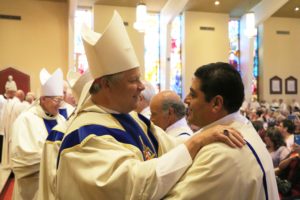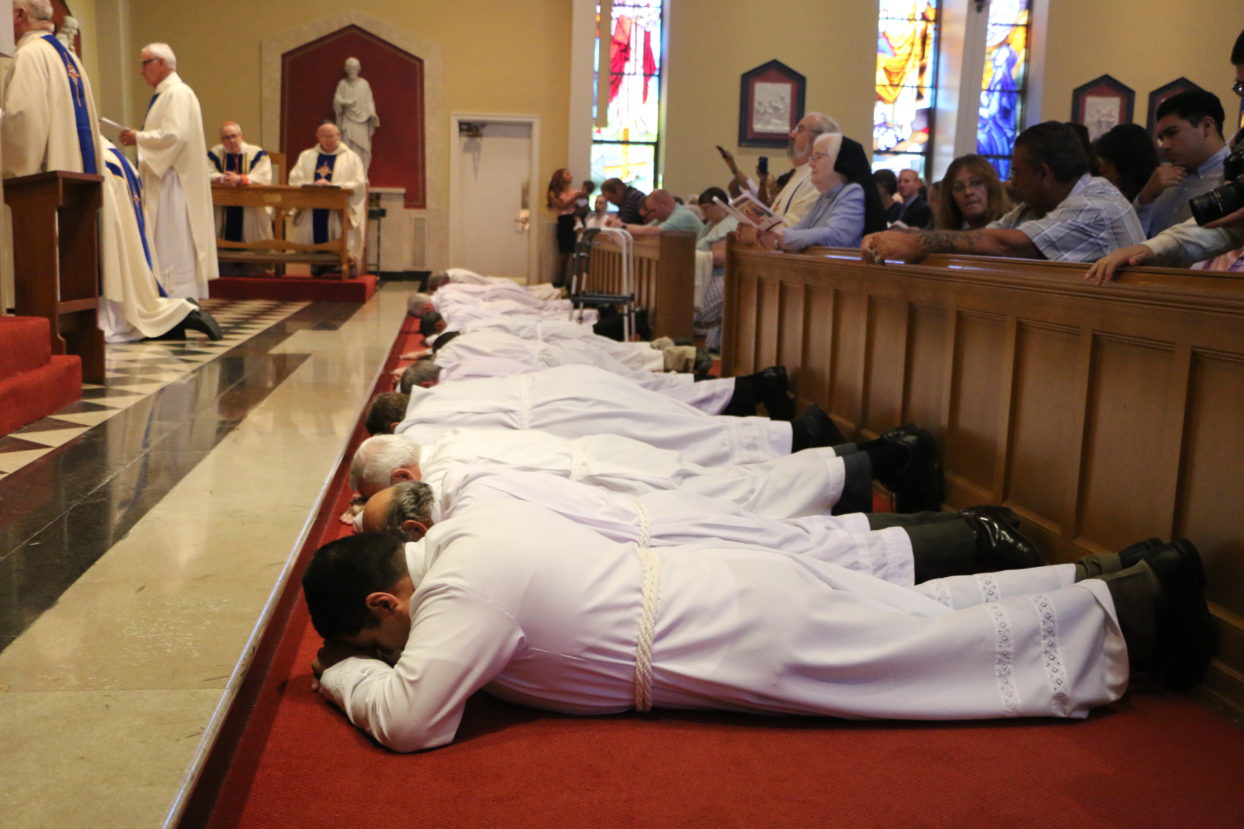Journey to the permanent diaconate proves very rewarding
By Emily Booker
It has been a long time journey for the men recently ordained to the permanent diaconate in the Diocese of Knoxville. Discerning the call from God, preparing for ordination, and balancing family and Church obligations take a lot of work and prayers.
For some, the call to the diaconate was clear and sudden. For others, it was a more gradual process.
Deacon Fredy Vargas received the call to the diaconate while on a bus in Colombia. He had traveled there for the ordination of Father Andres Cano in 2009. Bishop Richard Stika also was on that bus, and when he learned that Deacon Vargas was from Knoxville, they began talking.
“He shook my hand, looked me in the eye, and said, ‘One day, you’re going to be a good deacon,’” Deacon Vargas recalled. “Here I am, six years later.”
Deacon Phillip Talmadge was already involved in parish life — he was a Knight of Columbus and served on the parish council at St. Mary in Athens. Then he heard about the new diaconate class forming.
“I told God, ‘Well, I’m going to raise my hand, and I’ll let you call me’; it just seemed that at every Mass I went to, I would hear the word ‘deacon,’ or something would happen,” he said.
But it took some time for his wife, Laura, to support the idea. Deacon Talmadge knew that without her support he couldn’t become a deacon, so he continued to pray about the matter. Every morning, he would pray the prayer of St. Francis of Assisi.
“I was praying that one morning, and she got up, and she said, ‘Well, I’ve decided you can do it,’” he said.
Deacon Don Griffith would get thoughts of being a deacon while in adoration.
“I would end up crying because, like, ‘Why are you asking me, Lord?’” he said. Then Bishop Stika visited St. Mary Church in Johnson City and spoke about vocations.
Parishioners filled out index cards, naming people who they thought might make a good religious, priest, or deacon. Someone submitted Deacon Griffith’s name.
“It was very helpful that someone else turned my name in,” he said. “Even though I had those thoughts in front of the Blessed Sacrament in adoration, I would not have acted on it had not this person turned in that card.”
He explained that while he was feeling drawn to the diaconate, he wanted to make sure the calling was authentic. Having someone else recognize that he might be a good deacon and having to go through a formation process brought comfort.
“We don’t do things on our own in the Catholic Church,” Deacon Griffith said.
 The formation process for the diaconate takes several years of commitment and study. The aspirants found it challenging to balance work, family, and study, but they all felt that it was worth it.
The formation process for the diaconate takes several years of commitment and study. The aspirants found it challenging to balance work, family, and study, but they all felt that it was worth it.
“It’s one of those things where you think you know your own faith, and when you start a process like this, you find out that you don’t,” Deacon Vargas said.
Deacon Griffith agreed: “What you know gets challenged, and stretched, and maybe even torn down, then rebuilt. … That process is ongoing for all of us.”
Deacon Griffith is not the only person in his family called to holy orders. His son, Zachary, is a seminarian at Kenrick-Glennon Seminary in St. Louis. Father and son began their formation only a few months apart, but Zachary still has three more years of school.
“We talk about it a lot. I’m always asking, ‘What books are you reading? What kind of things are they teaching you?’ It’s very exciting,” Deacon Griffith said.
Discernment affects the whole family. Deacon Griffith said of his wife, Patty, “It’s her testimony. This is God’s action in her life, to turn the heat up on her faith, to have both of us go through this process.”
The support of family, especially of wives, during the formation process is crucial. And experiencing the loss of a loved one can be a terrible challenge. In 2014, Deacon Talmadge’s wife, Laura, passed away. The loss caused him to question whether or not to continue on the path to the diaconate. He also considered whether or not to begin the process for priesthood.
“It’s like I was in the middle of a snowstorm, and I couldn’t see the road,” he said. “But I knew before the snow came that the road was straight, and so I decided that I knew that the road I was on prior to her death was the diaconate. I was really confident that that was the way I needed to go.”
After going through such an experience, Deacon Talmadge believes it will help him to serve the elderly, those in hospice care, and those who are experiencing the loss of a loved one.
Deacon Vargas’ mother passed away last year. He recalls how she was looking forward to his ordination.
“She got to get me my alb and some other things. We picked those together. She was very excited about it.”
The ordination took place on June 11 at Sacred Heart Cathedral. Twenty-three men were ordained as deacons for the diocese after years of studying together and praying for one another. There are 24 men in the diaconate class, but Larry Rossini was hospitalized just before the ordination and will be ordained at a later date.
Deacon Vargas was moved by the ordination Mass.
“I could feel the Holy Spirit there, and I couldn’t hold it — the tears. It was very powerful.”
Deacon Talmadge also experienced the Holy Spirit during the Mass: “It was sad that my wife was not there, but it was very, very moving. I certainly felt touched by God.”
Right after the ordination, Deacon Griffith was back in Johnson City for the vigil Mass at St. Mary.
“I was very joy-filled,” he said of his first Mass as a deacon. “The people were very kind and gracious. I was just overwhelmed with joy, I suppose, beaming. I couldn’t stop smiling.”
Now, all the newly ordained deacons are settling into their new roles serving the Church in their various parishes and ministries.
“I don’t know what to expect really, but I’m ready,” said Deacon Vargas, who will be serving at All Saints in Knoxville. “I’m ready to serve, as I promised.”

